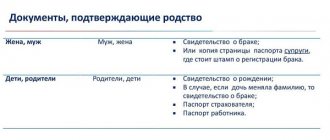Changing a child's data upon adoption
The result of adoption is the creation of a new family. Strangers and someone else's child become official relatives.
Expert opinion
Stanislav Evseev
Lawyer. Experience 12 years. Specialization: civil, family, inheritance law.
In the event of the birth of a baby, the mother and father independently choose his name and determine his surname (if the spouses have different surnames). The child being adopted already has personal information.
Art. 139 of the RF IC provides for the possibility of maintaining the secret of family structure. But this is impossible if the minor has other data. For this purpose, the legislator has provided the opportunity to change the adoptee's last name, first name, patronymic and date of birth.
The rules for changing each personal data are established by the Family Code of the Russian Federation and the Federal Law of 1997 No. 143.
A prerequisite for changing data is the initiative of the adoptive parent. He must include this requirement in the claim. If the citizen did not indicate that the data needs to be changed and a new full name and date of birth, then the court will retain his data for the minor (Article 134 of the RF IC). You cannot go to court again to make changes.
Information about changes in personal data is indicated in the court decision. After entering into legal force, the court, within 3 days, transfers the decision to the civil registry office at the place where the baby’s birth was registered.
Does middle name change upon adoption?
Art. 134 of the RF IC establishes the procedure for changing the patronymic name of an adopted minor. If the adoptive parent has not made such a demand, then the middle name formed on behalf of the blood father is retained. If the mother of the minor was not married or paternity was not established, then the child retains the patronymic given to him by the mother.
Rules for changing patronymics:
- If a married couple acts as adoptive parents, at their request, the patronymic name can be formed on behalf of the adoptive parent.
- If a single woman acts as an adoptive parent, she can keep the minor’s middle name or change it to any other.
- If an intra-family adoption is carried out, the natural parent must give the adoptive parent consent to change the son/daughter’s data.
Example . Roman filed an application to the court to adopt his stepson. His wife agreed to change her son's surname and patronymic. The boy did not know that the adoptive father was not his blood father, so it was impossible to question the minor in court. The court took into account the circumstances and satisfied the applicant's demands.
Rules for determining a surname
Rules for changing full name the adopted child is contained in Art. 134 RF IC .
| No. | Rules |
| 1 | If the adoptive parents do not request a change of surname, then the data of the blood parents is saved |
| 2 | If the adoptive parents have different surnames, then they independently choose which one will be assigned to the baby |
| 3 | If an intra-family adoption occurs, then with the consent of the blood parent, the court may change the surname of the adoptive parent |
Example . Upon marriage, Irina decided to leave her last name. After marriage, the couple decided to adopt the baby. When submitting the application, a dispute arose about what data to assign to the adoptee. The couple decided to leave this decision to the discretion of the court. Since the lawsuit did not contain a specific surname that should be assigned to the child, the court retained the data of his blood parents.
If the device is issued in relation to a minor over the age of 10 years , then his consent will be a prerequisite. Otherwise, the court will violate the child’s right to personal data.
As an exception, there is a situation where a minor lives for several years in the family of adoptive parents and considers them his parents. In this case, the judge does not involve the child in the process.
In case of cancellation of adoption, citizens have the right to demand that the minor's surname be changed back.
Legislative framework of the Russian Federation
valid Editorial from 25.11.2013
detailed information
| Name of document | “FAMILY CODE OF THE RUSSIAN FEDERATION” dated December 29, 1995 N 223-FZ (as amended on November 25, 2013 with amendments that entered into force on November 25, 2013) |
| Document type | code, family code |
| Receiving authority | President of the Russian Federation, State Duma of the Russian Federation |
| Document Number | 223-FZ |
| Acceptance date | 01.03.1996 |
| Revision date | 25.11.2013 |
| Date of registration with the Ministry of Justice | 01.01.1970 |
| Status | valid |
| Publication |
|
| Navigator | Notes |
“FAMILY CODE OF THE RUSSIAN FEDERATION” dated December 29, 1995 N 223-FZ (as amended on November 25, 2013 with amendments that entered into force on November 25, 2013)
Chapter 19 Adoption of children
Article 124. Children for whom adoption is permitted
1. Adoption (hereinafter referred to as adoption) is a priority form of placement for children left without parental care.
(as amended by Federal Law dated June 27, 1998 N 94-FZ)
2. Adoption is permitted in relation to minor children and only in their interests in compliance with the requirements of paragraph three of paragraph 1 of Article 123 of this Code, as well as taking into account the opportunities to provide children with full physical, mental, spiritual and moral development.
(as amended by Federal Law dated June 27, 1998 N 94-FZ)
3. The adoption of brothers and sisters by different persons is not allowed, except in cases where the adoption is in the interests of the children.
(as amended by Federal Law dated June 27, 1998 N 94-FZ)
4. The adoption of children by foreign citizens or stateless persons is permitted only in cases where it is not possible to transfer these children for upbringing to families of citizens of the Russian Federation permanently residing in the territory of the Russian Federation, or for adoption to relatives of the children, regardless of the citizenship and place of residence of these relatives .
Children may be placed for adoption by citizens of the Russian Federation permanently residing outside the territory of the Russian Federation, foreign citizens or stateless persons who are not relatives of the children, after twelve months from the date of receipt of information about such children in the federal data bank on children left without parental care, in accordance with paragraph 3 of Article 122 of this Code.
(as amended by Federal Laws dated June 27, 1998 N 94-FZ, dated December 28, 2004 N 185-FZ, dated July 2, 2013 N 167-FZ)
Article 125. Procedure for adopting a child
1. Adoption is carried out by the court upon the application of the person(s) wishing to adopt the child. Consideration of cases on establishing the adoption of a child is carried out by the court in a special proceeding according to the rules provided for by civil procedural legislation.
Cases on establishing the adoption of children are considered by the court with the obligatory participation of the adoptive parents themselves, the guardianship and trusteeship authorities, as well as the prosecutor.
(as amended by Federal Law dated June 27, 1998 N 94-FZ)
2. To establish the adoption of a child, a conclusion from the guardianship and trusteeship authority is required on the validity of the adoption and its compliance with the interests of the adopted child, indicating information about the fact of personal communication between the adoptive parents (adoptive parent) and the adopted child.
The procedure for transferring children for adoption, as well as monitoring the living conditions and upbringing of children in adoptive families on the territory of the Russian Federation is determined by the Government of the Russian Federation.
(as amended by Federal Law dated June 27, 1998 N 94-FZ)
3. The rights and obligations of the adoptive parent and the adopted child (Article 137 of this Code) arise from the date the court decision on establishing the adoption of the child enters into legal force.
The court is obliged, within three days from the date of entry into legal force of the court decision to establish the adoption of a child, to send an extract from this court decision to the civil registry office at the place where the decision was made.
The adoption of a child is subject to state registration in the manner established for state registration of civil status acts.
(as amended by Federal Law dated June 27, 1998 N 94-FZ)
Article 126. Registration of children subject to adoption and persons wishing to adopt children
1. Registration of children subject to adoption is carried out in the manner established by paragraph 3 of Article 122 of this Code.
2. Registration of persons wishing to adopt children is carried out in the manner determined by the executive authorities of the constituent entities of the Russian Federation.
Registration of foreign citizens and stateless persons wishing to adopt children who are citizens of the Russian Federation is carried out by the executive authorities of the constituent entities of the Russian Federation or the federal executive authority (clause 3 of Article 122 of this Code).
Article 126.1. Inadmissibility of intermediary activities in the adoption of children
(as amended by Federal Law dated June 27, 1998 N 94-FZ)
1. Intermediary activity in the adoption of children, that is, any activity of other persons for the purpose of selecting and transferring children for adoption on behalf and in the interests of persons wishing to adopt children, is not permitted.
2. The activities of guardianship and trusteeship bodies and executive authorities in fulfilling their duties to identify and place children left without parental care, as well as the activities of bodies or organizations specially authorized by foreign states for the adoption of children, which carried out on the territory of the Russian Federation by virtue of an international treaty of the Russian Federation or on the basis of the principle of reciprocity. The bodies and organizations specified in this paragraph cannot pursue commercial goals in their activities.
The procedure for the activities of bodies and organizations of foreign states for the adoption of children on the territory of the Russian Federation and the procedure for monitoring its implementation are established by the Government of the Russian Federation on the proposal of the Ministry of Justice of the Russian Federation and the Ministry of Foreign Affairs of the Russian Federation.
3. The mandatory personal participation of persons (persons) wishing to adopt a child in the adoption process does not deprive them of the right to simultaneously have their own representative, whose rights and obligations are established by civil and civil procedural legislation, as well as to use the services of an interpreter, if necessary.
4. Responsibility for the implementation of intermediary activities for the adoption of children is established by the legislation of the Russian Federation.
Article 127. Persons having the right to be adoptive parents
1. Adoptive parents may be adults of both sexes, with the exception of:
persons recognized by the court as incompetent or partially capable;
spouses, one of whom is recognized by the court as incompetent or partially capable;
persons deprived of parental rights by court or limited by court in parental rights;
persons removed from the duties of a guardian (trustee) for improper performance of the duties assigned to him by law;
former adoptive parents, if the adoption was canceled by the court due to their fault;
persons who, for health reasons, are unable to adopt a child. The list of diseases in the presence of which a person cannot adopt a child, take him into guardianship, trusteeship, or take him into a foster or foster family is established by the Government of the Russian Federation. Medical examination of persons wishing to adopt children left without parental care is carried out within the framework of the program of state guarantees of free medical care to citizens in the manner established by the federal executive body authorized by the Government of the Russian Federation;
(as amended by Federal Laws dated July 2, 2013 N 167-FZ, dated November 25, 2013 N 317-FZ)
persons who, at the time of adoption, do not have an income that provides the adopted child with the subsistence minimum established in the constituent entity of the Russian Federation in whose territory the adoptive parents (adoptive parent) reside;
(as amended by Federal Law dated June 27, 1998 N 94-FZ)
persons without permanent residence;
(as amended by Federal Laws dated June 27, 1998 N 94-FZ, dated December 28, 2004 N 185-FZ)
persons who have or have had a criminal record, are or have been subject to criminal prosecution (except for persons against whom criminal prosecution was terminated on rehabilitative grounds) for crimes against life and health, freedom, honor and dignity of the individual (with the exception of illegal placement in a psychiatric hospital, slander and insults), sexual integrity and sexual freedom of the individual, against family and minors, public health and public morality, as well as against public safety;
(as amended by Federal Law dated December 23, 2010 N 386-FZ)
Zakonbase: Paragraph ten of paragraph 1 of Art. 127 of the Family Code of the Russian Federation is recognized as inconsistent with the Constitution of the Russian Federation, its Art. 7 (part 2), 19 (part 1), 38 (parts and), 46 (part 1) and 55 (part 3), to the extent that the prohibition on adoption of children provided for by it applies to persons who have had a criminal record for the specified in this legal provision, crimes (except for those related to the categories of grave and especially grave crimes, as well as crimes against sexual integrity and sexual freedom of the individual, regardless of the severity), or persons against whom criminal prosecution in connection with crimes not classified as grave and especially serious ones, as well as crimes against sexual integrity and sexual freedom of the individual, were terminated on non-rehabilitative grounds - insofar as, due to the unconditional nature of this prohibition, the court when considering cases on establishing adoption, including in cases where the potential adoptive parent (if the existence of the actual relationship between him and the child and taking into account the nature of the act he committed or was charged with) is able to ensure the full physical, spiritual and moral development of the adopted child without the risk of endangering his psyche and health, is not authorized to take into account the circumstances of the crime committed, the period, elapsed from the moment of its commission, the form of guilt, circumstances characterizing the person, including the behavior of the person after the commission of the crime, as well as other circumstances significant to the case (Resolution of the Constitutional Court of the Russian Federation of January 31, 2014 N 1-P).
persons who have an unexpunged or outstanding conviction for serious or especially serious crimes;
(as amended by Federal Law dated December 23, 2010 N 386-FZ)
Paragraph 12 - No longer valid.
(as amended by Federal Law dated July 2, 2013 N 167-FZ)
persons who have not undergone training in the manner established by paragraph 4 of this article (except for close relatives of the child, as well as persons who are or were adoptive parents and in respect of whom the adoption has not been canceled, and persons who are or were guardians (trustees) of children and who have not been suspended from performing their duties).
(as amended by Federal Laws dated November 30, 2011 N 351-FZ, dated July 2, 2013 N 167-FZ)
persons who are in a union concluded between persons of the same sex, recognized as a marriage and registered in accordance with the legislation of the state in which such marriage is permitted, as well as persons who are citizens of the said state and are not married.
(as amended by Federal Law dated July 2, 2013 N 167-FZ)
1.1. When making a decision on the adoption of a child, the court has the right to deviate from the provisions established by paragraphs eight, twelve and thirteen of paragraph 1 of this article, taking into account the interests of the child being adopted and circumstances worthy of attention.
(as amended by Federal Laws dated December 28, 2004 N 185-FZ, dated December 23, 2010 N 386-FZ, dated November 30, 2011 N 351-FZ)
1.2. The provisions established by paragraphs eight, twelve and thirteen of paragraph 1 of this article do not apply to the stepfather (stepmother) of the adopted child.
(as amended by Federal Laws dated December 28, 2004 N 185-FZ, dated December 23, 2010 N 386-FZ, dated November 30, 2011 N 351-FZ)
2. Persons who are not married to each other cannot jointly adopt the same child.
3. If there are several persons wishing to adopt the same child, the priority right is given to the child’s relatives, subject to the mandatory compliance with the requirements of paragraphs 1 and 2 of this article and the interests of the child being adopted.
(as amended by Federal Law dated June 27, 1998 N 94-FZ)
4. In order to facilitate the psychological, pedagogical and legal training of persons wishing to adopt a child left without parental care into their family, they are trained according to a program approved by the executive authorities of the constituent entities of the Russian Federation.
(as amended by Federal Law dated July 2, 2013 N 167-FZ)
Requirements for the content of the training program, the procedure for organizing and carrying out training activities for persons wishing to adopt a child left without parental care into their family, and the form of the certificate of completion of such training on the territory of the Russian Federation are approved by the federal executive body authorized by the Government of the Russian Federation.
(as amended by Federal Law dated July 2, 2013 N 167-FZ)
Organization of training for persons wishing to adopt a child left without parental care into their family is carried out by the guardianship and trusteeship authorities at the expense and within the limits of funds provided for these purposes in the budget of a constituent entity of the Russian Federation.
(as amended by Federal Law dated November 30, 2011 N 351-FZ)
Foreign citizens, stateless persons or citizens of the Russian Federation permanently residing outside the territory of the Russian Federation who wish to adopt into their family a child left without parental care and who is a citizen of the Russian Federation may submit documents confirming that they have undergone appropriate training on the territory of the state , in which they permanently reside, taking into account the topic and in an amount not less than that provided for by the requirements specified in paragraph two of this paragraph for the content of the training program for persons wishing to adopt a child left without parental care into their family.
(as amended by Federal Law dated November 30, 2011 N 351-FZ)
In the event that foreign citizens, stateless persons or citizens of the Russian Federation permanently residing outside the territory of the Russian Federation, who wish to adopt a child left without parental care into their family, have not undergone appropriate training in the territory of the foreign state in which they permanently reside, the specified training is carried out on the territory of the Russian Federation in the manner established by this paragraph.
(as amended by Federal Law dated November 30, 2011 N 351-FZ)
Article 128. Age difference between the adoptive parent and the child being adopted
1. The age difference between the unmarried adoptive parent and the child being adopted must, as a rule, be at least sixteen years. For reasons recognized by the court as valid, the age difference may be reduced.
(as amended by Federal Law dated July 2, 2013 N 167-FZ)
2. When a child is adopted by a stepfather (stepmother), the age difference established by paragraph 1 of this article is not required.
Article 129. Consent of parents to adopt a child
1. To adopt a child, the consent of his parents is required. When adopting a child of minor parents under the age of sixteen, the consent of their parents or guardians (trustees) is also required, and in the absence of parents or guardians (trustees), the consent of the guardianship and trusteeship authority.
The consent of the parents to adopt a child must be expressed in a statement notarized or certified by the head of the organization in which the child left without parental care is located, or by the guardianship and trusteeship authority at the place of adoption of the child or at the place of residence of the parents, and can also be expressed directly in court during adoption proceedings.
(as amended by Federal Law No. 49-FZ dated April 24, 2008)
2. Parents have the right to withdraw their consent to the adoption of a child before a court decision on his adoption is made.
3. Parents may give consent to the adoption of a child by a specific person or without indicating a specific person. Parents' consent to adopt a child can only be given after his birth. (as amended by Federal Law dated June 27, 1998 N 94-FZ)
Article 130. Adoption of a child without parental consent
The consent of the child’s parents for his adoption is not required if they:
unknown or recognized by the court as missing;
declared incompetent by the court;
deprived of parental rights by the court (subject to the requirements of paragraph 6 of Article 71 of this Code);
for reasons recognized by the court as disrespectful, they do not live with the child for more than six months and evade his upbringing and maintenance.
Article 131. Consent to the adoption of children of guardians (trustees), adoptive parents, heads of organizations in which there are children left without parental care
(as amended by Federal Law No. 49-FZ dated April 24, 2008)
1. For the adoption of children under guardianship (trusteeship), written consent of their guardians (trustees) is required.
To adopt children in foster care, written consent from the adoptive parents is required.
For the adoption of children left without parental care and located in educational institutions, medical organizations, social welfare institutions and similar organizations, written consent from the heads of these organizations is required.
(as amended by Federal Laws dated April 24, 2008 N 49-FZ, dated November 25, 2013 N 317-FZ)
2. The court has the right, in the interests of the child, to make a decision on his adoption without the consent of the persons specified in paragraph 1 of this article.
Article 132. Consent of the adopted child to adoption
1. To adopt a child who has reached the age of ten years, his consent is required.
2. If, before filing an application for adoption, the child lived in the family of the adoptive parent and considers him to be his parent, adoption, as an exception, can be carried out without obtaining the consent of the child being adopted.
Article 133. Consent of the adoptive parent’s spouse to adopt a child
1. When adopting a child by one of the spouses, the consent of the other spouse to adoption is required, unless the child is adopted by both spouses.
2. The consent of the spouse to adopt a child is not required if the spouses have terminated family relations, have not lived together for more than a year and the place of residence of the other spouse is unknown.
Article 134. First name, patronymic and last name of the adopted child
1. An adopted child retains his first name, patronymic and last name.
2. At the request of the adoptive parent, the adopted child is assigned the surname of the adoptive parent, as well as the given name. The patronymic name of the adopted child is determined by the name of the adoptive parent, if the adoptive parent is a man, and if the child is adopted by a woman, by the name of the person indicated by her as the father of the adopted child. If the surnames of the adoptive spouses are different, by agreement of the adoptive spouses, the adopted child is assigned the surname of one of them.
3. When a child is adopted by an unmarried person, at his request, the last name, first name and patronymic of the mother (father) of the adopted child are recorded in the birth register at the direction of this person (adoptive parent).
4. A change in the surname, name and patronymic of an adopted child who has reached the age of ten years can be made only with his consent, except for the cases provided for in paragraph 2 of Article 132 of this Code.
5. A change in the surname, name and patronymic of an adopted child is indicated in the court decision on his adoption.
Article 135. Change of date and place of birth of an adopted child
1. To ensure the secrecy of adoption, at the request of the adoptive parent, the date of birth of the adopted child may be changed, but not more than by three months, as well as the place of his birth.
Changing the date of birth of an adopted child is allowed only when adopting a child under one year of age. For reasons recognized by the court as valid, changing the date of birth of an adopted child may be permitted when adopting a child who has reached the age of one year or older.
(as amended by Federal Law dated December 28, 2004 N 185-FZ)
2. Changes in the date and (or) place of birth of an adopted child are indicated in the court decision on his adoption.
Article 136. Registration of adoptive parents as parents of an adopted child
1. At the request of the adoptive parents, the court may decide to record the adoptive parents in the birth register as the parents of the child adopted by them.
2. To make such an entry in relation to an adopted child who has reached the age of ten years, his consent is required, except for the cases provided for in paragraph 2 of Article 132 of this Code.
3. The need to make such a record is indicated in the court decision on the adoption of a child.
Article 137. Legal consequences of adopting a child
1. Adopted children and their offspring in relation to adoptive parents and their relatives, and adoptive parents and their relatives in relation to adopted children and their offspring are equal in personal non-property and property rights and obligations to relatives by origin.
2. Adopted children lose personal non-property and property rights and are released from responsibilities towards their parents (their relatives).
3. When a child is adopted by one person, personal non-property and property rights and obligations can be preserved at the request of the mother, if the adoptive parent is a man, or at the request of the father, if the adoptive parent is a woman.
4. If one of the parents of an adopted child has died, then, at the request of the parents of the deceased parent (grandfather or grandmother of the child), personal non-property and property rights and obligations in relation to the relatives of the deceased parent may be preserved if the interests of the child so require. The right of relatives of a deceased parent to communicate with an adopted child is exercised in accordance with Article 67 of this Code.
5. The preservation of the relationship of the adopted child with one of the parents or with the relatives of the deceased parent is indicated in the court decision on the adoption of the child.
6. The legal consequences of the adoption of a child, provided for in paragraphs 1 and 2 of this article, occur regardless of the entry of the adoptive parents as parents in the birth certificate of this child.
Article 138. Retention of the adopted child’s right to a pension and benefits
A child who at the time of his adoption has the right to a pension and benefits due to him in connection with the death of his parents retains this right upon his adoption.
Article 139. Secret of adoption of a child
1. The secrecy of the adoption of a child is protected by law.
Judges who made a decision on the adoption of a child, or officials who carried out state registration of adoption, as well as persons otherwise aware of the adoption, are obliged to maintain the secrecy of the adoption of a child.
2. The persons specified in paragraph 1 of this article, who divulge the secret of the adoption of a child against the will of his adoptive parents, are held accountable in the manner prescribed by law.
Article 140. Cancellation of adoption of a child
1. Cancellation of the adoption of a child is carried out in court.
2. The case of canceling the adoption of a child is considered with the participation of the guardianship and trusteeship authority, as well as the prosecutor.
3. Adoption terminates from the day the court decision to cancel the adoption of the child enters into legal force.
The court is obliged, within three days from the date of entry into legal force of the court decision to cancel the adoption of a child, to send an extract from this court decision to the civil registry office at the place of state registration of the adoption.
Article 141. Grounds for canceling the adoption of a child
1. The adoption of a child may be canceled in cases where the adoptive parents shirk their duties as parents, abuse parental rights, abuse the adopted child, or suffer from chronic alcoholism or drug addiction.
2. The court has the right to cancel the adoption of a child on other grounds based on the interests of the child and taking into account the opinion of the child.
Article 142. Persons who have the right to demand the cancellation of the adoption of a child
The right to demand the cancellation of the adoption of a child belongs to his parents, the child’s adoptive parents, an adopted child who has reached the age of fourteen years, the guardianship and trusteeship authority, as well as the prosecutor.
Article 143. Consequences of canceling the adoption of a child
1. When the court cancels the adoption of a child, the mutual rights and obligations of the adopted child and the adoptive parents (relatives of the adoptive parents) are terminated and the mutual rights and obligations of the child and his parents (his relatives) are restored if this is required by the interests of the child.
2. If the adoption is cancelled, the child is transferred to the parents by court decision. In the absence of parents, and also if the transfer of the child to the parents is contrary to his interests, the child is transferred to the care of the guardianship and trusteeship authority.
3. The court also resolves the question of whether the child retains the first name, patronymic and last name assigned to him in connection with his adoption.
Changing the name, patronymic or surname of a child who has reached the age of ten is possible only with his consent.
4. The court, based on the interests of the child, has the right to oblige the former adoptive parent to pay funds for the maintenance of the child in the amount established by the articles of this Code.
Article 144. Inadmissibility of cancellation of adoption after the adopted child reaches the age of majority
Cancellation of the adoption of a child is not allowed if, at the time of filing a request to cancel the adoption, the adopted child has reached the age of majority, except in cases where such cancellation has the mutual consent of the adoptive parent and the adopted child, as well as the parents of the adopted child, if they are alive, have not been deprived of parental rights or are not recognized by the court as incompetent.
Is it possible to change a child's last name without adoption?
The right to change the personal data of a minor is vested in:
- blood parent, with the consent of the guardianship department, - in relation to a child under 10 years ;
- blood parent, with the consent of the guardianship department and the minor - in relation to a son/daughter aged 10 to 14 years ;
- a minor, with the consent of a guardian or blood parent, between the ages of 14 and 18 years .
Important! Changing the surname of a ward aged 14 to 18 years with the data of the trustee is not a reason for the emergence of a family relationship between the minor and the legal representative.
The law prohibits a guardian from changing the personal data of a ward. Identification of the fact of everyday changes in data can be interpreted as a violation of children's rights. The exception is when the guardian plans to adopt the child in the future.
Example . Tatyana was the guardian of the minor Polina. The girl was in care from infancy. The woman knew that if adopted, she would lose the right to guardianship benefits. Therefore, I decided to postpone the registration until the girl needs to go to 1st grade. However, at home the ward was called Caroline and her birthday was celebrated on a different date. During the trial, the court granted the request to change personal data. However, the date of birth was retained.
What is needed to adopt a child in Russia?
So, where to start and what is required to adopt a child in Russia? Despite the apparent complexity of the procedure, it all comes down to three steps:
- collection of documents
- judgment
- adoption registration
You should have a minimum set of documents with you when you first contact the guardianship department. This:
- passport
- income certificate
- documents for housing
Even if the certificates do not comply with the required forms, their presence will indicate that your step was thoughtful. In the future you will be required to:
- statement of your wishes;
- a complete and detailed autobiography;
- medical report in the prescribed form;
- criminal record certificate;
- 2NDFL certificate;
- documents for housing.
You will be sent to study at the school of adoptive parents and, if you successfully complete it (taking into account meeting all the requirements), you will be registered as potential adoptive parents.
The next step will be choosing a child. After which the court will consider your adoption case and make an appropriate decision. Having received a positive court decision, you can register the child with your family.
In the following video, a young couple shares their experience and talks about what is needed to adopt a child in Russia:









